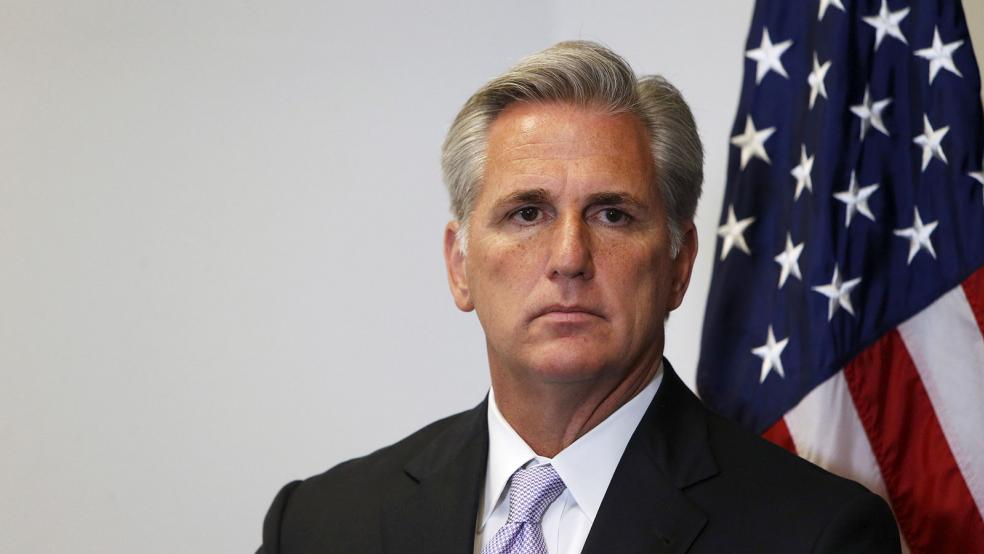Hillary Clinton may have finally caught a break in the ongoing scandal over her email and her conduct in the Benghazi tragedy — thanks to the presumptive new Speaker of the House.
Clinton, who has been suffering a steady slide in the polls in her bid for the Democratic presidential nomination, struck an indignant pose on Wednesday after House Majority Leader Kevin McCarthy (R-CA), the odds-on favorite to succeed resigning Speaker John Boehner, seemingly admitted that the Republicans launched a special committee investigation into the terrorist attack on a U.S. diplomatic outpost in Benghazi, Libya, to try to torpedo her presidential campaign.
Related: On Benghazi, Clinton and House GOP Are Spoiling For a Fight
"Everybody thought Hillary Clinton was unbeatable, right?" McCarthy said during an interview late Tuesday with Fox News’s Sean Hannity. "But we put together a Benghazi special committee, a select committee. What are her numbers today? Her numbers are dropping. Why? Because she's untrustable. But no one would have known any of that had happened, had we not fought."
Amid a chorus of outraged Democrats, Clinton pronounced McCarthy’s comments as validation of her long-standing insistence that GOP investigations of the 2012 Benghazi attack that killed U.S. Ambassador J. Christopher Stevens and three other Americans were politically motivated to try to destroy her presidential ambitions.
Clinton and her supporters have long characterized the creation of the Select Committee on Benghazi headed by Rep. Trey Gowdy (R-SC) as a political fishing expedition and show trial — and just another chapter in the “right-wing conspiracy” to attack her and her husband, former President Bill Clinton.
“So when I hear a statement like that, which demonstrates unequivocally that this was always meant to be a partisan political exercise, I feel like it does a grave disservice and dishonor not just the memory of the four that we lost, but of everybody who has served our country,” Clinton told the Rev. Al Sharpton in an interview on MSNBC.
Related: Bill Clinton Still Can’t Fess Up to One of His Biggest Blunders
McCarthy seemed to be eager to deflect Hannity’s sharp rebuke of Boehner and the House Republicans when he blurted out the Republicans' achievement in tarnishing Clinton’s reputation and helping to expose her use of a private email server during her four years as secretary of state.
"I give you credit for that," said Hannity. "I'll give you credit where credit is due."
Matt Sparks, a spokesman for McCarthy, issued a clarification Wednesday afternoon, saying that Republican-inspired investigations into Benghazi “have nothing to do with politics” and “everything to do with the consequences of what the former Secretary has done and her confusing, conflicting, and demonstrably false responses.”
Whatever McCarthy meant, the fact that the presumptive heir to the current speaker of the House would make such a clumsy political mistake is bad enough, but he did it in a way that reinforced another frequent criticism he faces, and which will only worsen once he is more in the public spotlight: The House majority leader is not a very articulate speaker.
Conservative radio host Mark Levin has, rather uncharitably, described McCarthy as “Eric Cantor with 10 less I.Q. points.” The mangled syntax of McCarthy’s Hannity interview did little to erase that perception.
Related: Republican Kevin McCarthy Says He Wants to Be House Speaker
In the space of a few sentences, he told Hannity that he’ll be a conservative speaker “that puts a strategy to fight and win,” and said the Benghazi panel is a win for conservatives because “no one would have known that any of that had happened had we not fought to make that happen.”
During a speech earlier this week to the John Hay Initiative, a neo-conservative organization, McCarthy declared: “If I look at history of where we are it seems a lot like 1979,” The Washington Post’s Dana Milbank reported. “We must engage this war of radical Islam if our life depended on it because it does,” McCarthy said.
Love John Boehner or hate him, the man can string sentences together that make sense and deliver coherent arguments about policy issues in a live interview. As Milbank has gone to some pains to show, the same can’t really be said for McCarthy. And for a party looking to him to present its ideas to voters during next year’s election campaign, that could be a problem.
Rob Garver contributed to this report.





